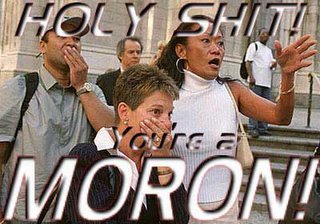This is an piece written by Holly Sklar. Trudge though it to get to mine:
Sklar wrote:
Rev. Martin Luther King Jr. was born on the brink of the Great Depression and died fighting for the right of workers to earn a decent living.
On March 18, 1968, days before his murder, King told striking sanitation workers in Memphis, Tenn., "It is criminal to have people working on a full-time basis…getting part-time income." King said, "We are tired of working our hands off and laboring every day and not even making a wage adequate with daily basic necessities of life."
Two years earlier, on March 18, 1966, King had called for Congress to boost the minimum wage. "We know of no more crucial civil rights issue facing Congress today than the need to increase the federal minimum wage and extend its coverage," he said. "A living wage should be the right of all working Americans."
King did not dream that in the year 2006, he would be remembered with a national holiday, but the value of the minimum wage would be lower than it was in the 1950s and 60s. At $5.15 an hour, today's minimum wage is nearly $4 less than it was in 1968, when it reached its historic high of $9.09, adjusted for inflation.
The minimum wage has become a poverty wage instead of an anti-poverty wage. A full-time worker at minimum wage makes just $10,712 a year—less than $900 a month—to cover housing, food, health care, transportation and other expenses.
As Congressional Quarterly observed in the wake of Hurricane Katrina, "In the Lower Ninth Ward and other impoverished neighborhoods of New Orleans, people have long waged battle to make ends meet... That was a nearly unattainable goal in a city where many of the jobs were in hotels and restaurants that paid around the federal minimum wage of $5.15 an hour."
A low minimum wage is a green light for miserly employers to pay poverty wages to a growing share of the workforce—not just workers at the minimum, but above it. In its 2005 Hunger and Homelessness Survey, the U.S. Conference of Mayors found that 40 percent of the adults requesting emergency food assistance were employed, as were 15 percent of the homeless.
A low minimum wage is a green light for greed. Between 1968 and 2004, domestic corporate profits rose 85 percent, while the minimum wage fell 41 percent and the average hourly wage fell 4 percent, adjusted for inflation. In the retail sector, which employs large numbers of workers at or near minimum wage, profits skyrocketed 159 percent.
With the federal minimum wage stuck in quicksand, a growing number of states have raised their state minimums above $5.15—Oregon and Washington are highest at $7.50 and $7.63, respectively. Studies by the Fiscal Policy Institute and others have shown that states with minimum wages above the federal level have had better employment trends than the other states, including for retail businesses and small businesses.
Dan Gardner, commissioner of Oregon's Bureau of Labor and Industries, says, "Overall most low-wage workers pump every dollar of their paychecks directly into the local economy by spending their money in their neighborhood stores, local pharmacies and corner markets. When the minimum wage increases, local economies benefit from the increased purchasing power."
In the words of Joel Marks, national director of the American Small Business Alliance, "Fair wages are good for business."
Congress itself has taken eight pay raises since 1997, while denying fair pay for minimum wage workers. On Jan. 1, congressional pay quietly rose to $165,200—up $31,600 since 1997. And unlike minimum wage workers, members of Congress have good health benefits, pensions and perks.
Wages are a bedrock moral issue.
It is immoral that workers who put food on our table go without health care to put food on theirs.
It is immoral that workers who care for children, the ill and the elderly struggle to care for their own families.
It is immoral that the minimum wage keeps people in poverty instead of out of poverty.
King would tell Congress to value workers and raise the minimum wage. We need a wage ethic to go with our work ethic.
My turn:In the Friday, January 20, paper, syndicated columnist Holly Sklar wrote, "We need wage ethics today." She wrote of the "need" to raise the minimum wage in America.
Brace yourself for my opinion, most of you won't agree with it; but please stay with me and let me explain. My opinion is that we should not have a minimum wage. If you want to work for $1.00 an hour, that's up to you.
Let's say that, today, there is no minimum wage. Can you live on $1.00 an hour? That's grossing $40.00 a week, after taxes, about $29.00 a week. I spend more than that on gas. I know I won't work for $1.00 an hour, so I won't take the job. If you won't take it either (and perhaps no one will) guess what? Whoever is hiring at $1.00 an hour is going to have to up their rate. The employer will have to raise their rate and perhaps their prices to compensate, but eventually they will be paying an acceptable wage and selling at acceptable prices. That's how the economy works. Costs go up, prices go up.
I used to work for minimum wage. I did that for about 1 month, then I received a (small) raise.
I continued to work there about 4 months total. That wasn't cutting it so I got a new job. It was second shift and a farther drive, but the pay was worth it so I made the switch. Will I ever work for minimum wage again? No. I can't pay the bills on it, so I won't do it. I'm betting you wouldn't take a job that didn't pay you enough to pay your bills either.
Sklar does not mention that most people don't work for minimum wage for long, either.
Now let me tackle her math. She states; "A low minimum wage is a green light for greed. Between 1968 and 2004, domestic corporate profits rose 85% while the minimum wage fell 41% and the average hourly wage fell 4%, adjusted for inflation. In the retail sector, which employs large numbers of workers at or near minimum wage, profits skyrocketed 159%."
The only way for profits to be up is for people to be spending money. Minimum wage may have stayed low or dropped compared to inflation; however, wages must have gone up somewhere or no one would have had the money to spend which increased profits. Low minimum wage is not a "green light for greed," it is a speed limit. If you want to work for $1.00 an hour, that's great for the company that hired you! They are going to do well because you are willing to work for $1.00 an hour.
Sklar does not mention that most of those working for minimum wage are teens who don't need the money, but want it. If the minimum wage is forced up, the cost of business goes up, which raises cost for consumers. You then make more, but you spend more, so not a lot has happened by raising the minimum wage.




